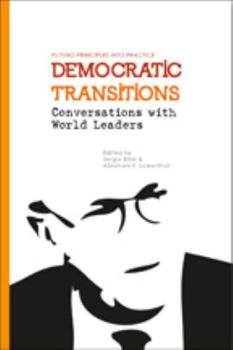Democratic Transitions: Conversations with World Leaders
Select Format
Select Condition 
Book Overview
Thirteen former presidents and prime ministers discuss how they helped their countries end authoritarian rule and achieve democracy.
National leaders who played key roles in transitions to democratic governance reveal how these were accomplished in Brazil, Chile, Ghana, Indonesia, Mexico, the Philippines, Poland, South Africa, and Spain. Commissioned by the International Institute for Democracy and Electoral Assistance (International IDEA), these interviews shed fascinating light on how repressive regimes were ended and democracy took hold.
In probing conversations with Fernando Henrique Cardoso, Patricio Aylwin, Ricardo Lagos, John Kufuor, Jerry Rawlings, B. J. Habibie, Ernesto Zedillo, Fidel V. Ramos, Aleksander Kwaśniewski, Tadeusz Mazowiecki, F. W. de Klerk, Thabo Mbeki, and Felipe Gonz lez, editors Sergio Bitar and Abraham F. Lowenthal focused on each leader's principal challenges and goals as well as their strategies to end authoritarian rule and construct democratic governance. Context-setting introductions by country experts highlight each nation's unique experience as well as recurrent challenges all transitions faced. A chapter by Georgina Waylen analyzes the role of women leaders, often underestimated. A foreword by Tunisia's former president, Mohamed Moncef Marzouki, underlines the book's relevance in North Africa, West Asia, and beyond.
The editors' conclusion distills lessons about how democratic transitions have been and can be carried out in a changing world, emphasizing the importance of political leadership. This unique book should be valuable for political leaders, civil society activists, journalists, scholars, and all who want to support democratic transitions.





